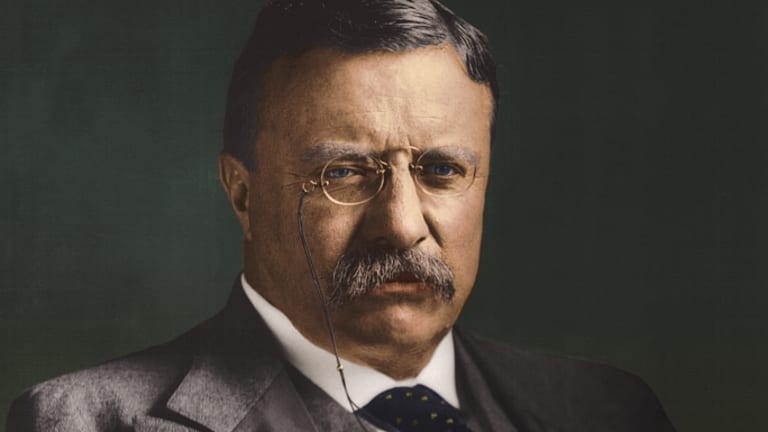Be Like Teddy: Football is for Everyone
Teddy Roosevelt ranks among the greatest presidents in American history. Now, that’s just One Man’s Opinion, but historians routinely place Roosevelt among the top 5.
Teddy also loved football — so much so, he’s widely credited for saving the college game in its infancy. While his impact on reforming the sport in 1905 is somewhat overstated, he did call on the university presidents and other decision-makers to convene and make the game safer amid a rash of grievous injuries and deaths.
Roosevelt’s love of football isn’t why he was a great president, as there have been plenty of lowly ranked Leaders of the World who loved the game: Richard Nixon, No. 32 of 45, tried to play at Whittier College, took it upon himself to crown college football’s national champion in 1969, submitted plays to the NFL’s Washington franchise and would often pull aside Hunter Thompson — a journalist who openly loathed Nixon — to talk about their shared love of the game.
No. 42 of 45, Donald Trump, owned a franchise in the USFL and attempted to gain ownership in the NFL on a number of occasions. Nos. 27 and 29 — Jimmy Carter and Gerald Ford — played in college: Carter for Navy’s sprint team, and Ford at Michigan.
No, simply loving football doesn’t qualify one to be a great president. But the qualities in football that Teddy Roosevelt touted shaped his leadership style.
Roosevelt championed the game for rewarding courage; for beckoning inner physical strength, and creative innovation. Football is the ultimate team game, and Teddy recognized that the value of the whole was only as substantial as its weakest part.
As president, Roosevelt helped pull America out of the malaise of failed Reconstruction and the corruption of the Gilded Age with the same guiding principles he celebrated from football. From that lens, the sport itself was reflective of the Progressive Age.
In the decades since, football has been a platform on which the masses could see Black men and Caucasians working together toward common goals. And if the bigoted and close-minded didn’t like it, to hell with ‘em.
Jim Thorpe became a legend, arguably the first nationwide college football star, while playing at Carlisle Indian School. His triumphs included a standout game against an Army team that included future Pres. Dwight Eisenhower.
Thorpe and his Carlisle teammates leveraged their celebrity to change public perception about Indigenous people.
Future Pres. Ford stood up for Black teammate Willis Ward when Georgia Tech demanded Ward be benched for their game. That more than anything else he did in Blue and Maize is Ford’s Michigan legacy — and he was a damn good player at Michigan.
A little more than a decade later, the University of San Francisco refused a spot in the Orange Bowl — a berth that, through the game’s payout, may have kept the program struggling financially amid the Korean War open — because the Orange Bowl didn’t want to bring a racially mixed team to Florida.
Maybe the Dons would have won without their star Black players. But refusing to play a segregated bowl game took even greater courage than the inherent resolve necessary to ever strap on a helmet.
The takeaway from the ‘51 Dons, and from Gerald Ford is that football is for everyone.
While women playing football was inconceivable in the age of Teddy Roosevelt’s presidency, it’s hardly a stretch to suggest he would champion the growing role of women in the game today. After all, Roosevelt took the even more controversial stance in 1912 that women deserved to vote.
So when I read comments like those from Matt Walsh, a sad and bitter little man whose purpose is to make others feel as toxic as he apparently feels, decrying women’s active participation in the sport, I can’t help but shake my head.
This spring, I profiled Heather Marini in Lindy’s Sports 2021 college football preview. Marini is the first-ever woman to hold a positions coach job in Div. I, overseeing quarterbacks at Brown University.
Marini — who played professionally in Australia before coming to the United States, which thus dispels David Pollack’s asinine hand-in-the-dirt dismissal of women on the Playoff committee made on College Gameday back in 2013 — has a potential NFL quarterback under her tutelage in E.J. Perry.
Marini also made a comment that resonates so profoundly when applied to this situation: “In this profession, the players figure you out quickly.”
In other words, those in the game sniff out bullshit right away. There’s another way in which football reflected Teddy Roosevelt’s presidency: The man saw through the toxicity of the Gilded Age when so many other regimes before his fell victim to it.
And on the idea that football isn’t for everyone, I have to believe Teddy would call bullshit.




